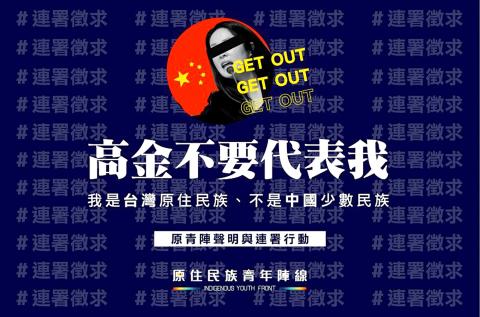An Aboriginal group yesterday criticized Non-Partisan Solidarity Union Legislator May Chin (高金素梅) over her remarks at a summit on cross-strait relations in Beijing.
Chin, who is of Atayal and Manchu ancestry, on Friday claimed to represent Taiwan’s Aborigines at the summit, where she advocated strict adherence to the so-called “1992 consensus” and the idea that “both sides of the Taiwan Strait are part of one China,” the Chinese-language China Times said.
Chin also called for a deepening of the cross-strait relationship and greater unity between the people of Taiwan and China, the paper said.

Photo taken from the Indigenous Youth Front Facebook page
“There is no consensus on the ‘1992 consensus.’ This ‘one China’ you [Chin] speak of has nothing to do with the indigenous people of Taiwan!” the Indigenous Youth Front said in an open letter.
Aboriginal officials should stick to their duties and not use their titles as bargaining chips to accumulate political capital, front representative Savungaz Valincinan said.
“Going to China and engaging in an exchange of personal benefits tramples on and degrades the sovereignty of the nation’s indigenous people,” she said.
Within four hours of its release, the letter, which lambasted other Aboriginal officials, such as Chinese Nationalist Party (KMT) legislators Sufin Siluko, Yosi Takun and Sra Kacaw for “losing sincerity” by promoting closer ties with China, had 500 signatures.
“We are Taiwanese Aborigines, not Chinese minorities. Please do not claim to represent us,” the letter said, adding that Aborigines have never signed an agreement with a modern nation to abandon their sovereign rights, and Aboriginal communities had fought for many years to have their sovereignty respected by the government.
The hard-fought achievements of the Aborigines of past generations made it possible to have the Republic of China Constitution amended to secure equal status and political participation for today’s Aborigines, it said.
Those who take part in political events in China as “Taiwanese Aboriginal representatives” are overstepping the boundaries of their positions, which are to protect the interests of Aborigines in the Legislative Yuan, it said.
Those representing Aborigines in the legislature are not involved at the community level, where local groups and their leaders were already in place, it said.
The failure of China’s “one country, two systems” formula in Hong Kong was proof that Beijing would never respect the sovereignty of Aborigines, it said.
“Although we are not fully satisfied with the current government in Taiwan, we are working hard to change it,” the letter said. “We definitely cannot accept a system that concentrates sovereignty into a single nation and does not respect Taiwan’s diversity.”
The “1992 consensus” — a term former Mainland Affairs Council chairman Su Chi (蘇起) admitted in 2006 to making up in 2000 — refers to an understanding between the KMT and Beijing that both sides acknowledge there is “one China,” with each side having its own interpretation of what “China” means.

AGING: As of last month, people aged 65 or older accounted for 20.06 percent of the total population and the number of couples who got married fell by 18,685 from 2024 Taiwan has surpassed South Korea as the country least willing to have children, with an annual crude birthrate of 4.62 per 1,000 people, Ministry of the Interior data showed yesterday. The nation was previously ranked the second-lowest country in terms of total fertility rate, or the average number of children a woman has in her lifetime. However, South Korea’s fertility rate began to recover from 2023, with total fertility rate rising from 0.72 and estimated to reach 0.82 to 0.85 by last year, and the crude birthrate projected at 6.7 per 1,000 people. Japan’s crude birthrate was projected to fall below six,

Conflict with Taiwan could leave China with “massive economic disruption, catastrophic military losses, significant social unrest, and devastating sanctions,” a US think tank said in a report released on Monday. The German Marshall Fund released a report titled If China Attacks Taiwan: The Consequences for China of “Minor Conflict” and “Major War” Scenarios. The report details the “massive” economic, military, social and international costs to China in the event of a minor conflict or major war with Taiwan, estimating that the Chinese People’s Liberation Army (PLA) could sustain losses of more than half of its active-duty ground forces, including 100,000 troops. Understanding Chinese

US President Donald Trump in an interview with the New York Times published on Thursday said that “it’s up to” Chinese President Xi Jinping (習近平) what China does on Taiwan, but that he would be “very unhappy” with a change in the “status quo.” “He [Xi] considers it to be a part of China, and that’s up to him what he’s going to be doing, but I’ve expressed to him that I would be very unhappy if he did that, and I don’t think he’ll do that. I hope he doesn’t do that,” Trump said. Trump made the comments in the context

SELF-DEFENSE: Tokyo has accelerated its spending goal and its defense minister said the nation needs to discuss whether it should develop nuclear-powered submarines China is ramping up objections to what it sees as Japan’s desire to acquire nuclear weapons, despite Tokyo’s longstanding renunciation of such arms, deepening another fissure in the two neighbors’ increasingly tense ties. In what appears to be a concerted effort, China’s foreign and defense ministries issued statements on Thursday condemning alleged remilitarism efforts by Tokyo. The remarks came as two of the country’s top think tanks jointly issued a 29-page report framing actions by “right-wing forces” in Japan as posing a “serious threat” to world peace. While that report did not define “right-wing forces,” the Chinese Ministry of Foreign Affairs was